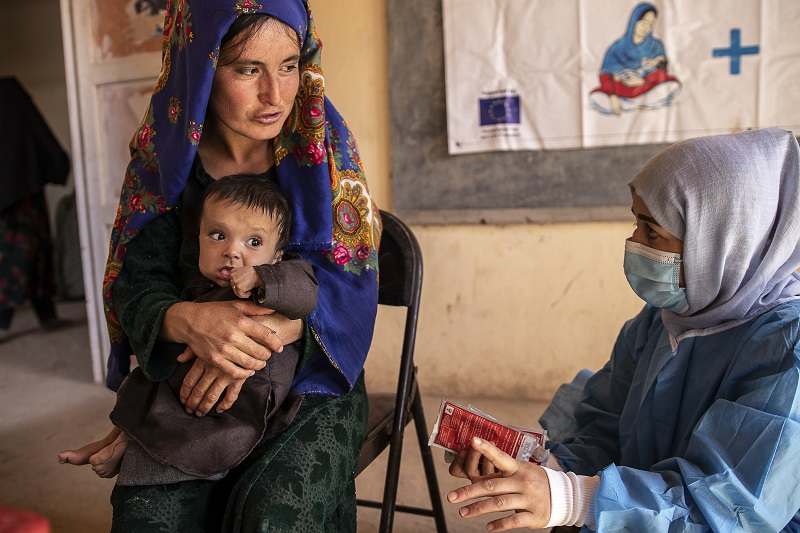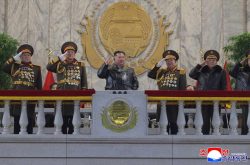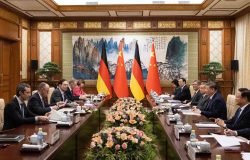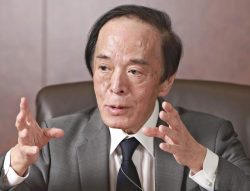
A Save the Children nutrition counsellor, right, explains to Nelab, 22, how to feed her 11-month-old daughter, Parsto, with therapeutic food, which is used to treat severe acute malnutrition, in Sar-e-Pul province of Afghanistan, Thursday, Sept. 29, 2022.
11:49 JST, January 2, 2023
KABUL, Afghanistan (AP) — A senior U.N. official in Afghanistan met on Sunday the deputy prime minister of the Taliban-led government to discuss a ban on women working for non-governmental groups that Afghan authorities have announced in a series of measures rolling back women’s rights.
The decision by the Taliban government to bar women from NGO work has prompted major international aid agencies to suspend operations in the country. The ban has raised fears that people will be deprived of food, education, healthcare and other critical services, as over half of Afghanistan’s population needs urgent humanitarian assistance.
Aid agencies have warned the ban will have catastrophic consequences and “hundreds and thousands” of Afghans will die because of the Taliban decision.
The deputy head of the U.N. Mission in Afghanistan, Potzel Markus, met Maulvi Abdul Salam Hanafi in the capital Kabul to discuss the ban, as well as other measures including barring women from universities.
“Banning women from working in non-governmental organizations, denying girls and women from education and training, harms millions of people in Afghanistan and prevents the delivery of vital aid to Afghan men, women, and children,” the U.N. mission said.
Potzel is the latest U.N. official to meet the Taliban’s leadership amid mounting international concern over the curtailing of women’s freedoms in Afghanistan.
Last Monday, the acting head of the U.N. mission Ramiz Alakbarov met Economy Minister Qari Din Mohammed Hanif.
Hanif issued the NGO ban on Dec. 24, allegedly because women weren’t wearing the Islamic headscarf, or hijab, correctly. He said any organization found not complying with the order will have its license revoked.
Aid agencies have been providing essential services and support in the face of a worsening humanitarian crisis in Afghanistan.
The Taliban takeover in 2021, as U.S. and NATO forces were in the final weeks of their pullout after 20 years of war, sent Afghanistan’s economy into a tailspin and transformed the country, driving millions into poverty and hunger. Foreign aid stopped almost overnight.
Sanctions on the Taliban rulers, including a halt on bank transfers and the freezing of billions in Afghanistan’s foreign assets have already restricted access to global institutions. Funds from aid agencies helped prop up the country’s aid-dependent economy before the Taliban takeover.
U.N. aid chief Martin Griffiths is due to visit Afghanistan to discuss the ban.
Potzel’s meeting with Hanafi came as a U.N. survey showed that a third of NGOs headed by women in Afghanistan have been forced to stop 70% of their activities due to the ban and around a third have stopped all their activities.
The U.N. Women’s Department said 86% of the 151 organizations surveyed have either stopped or are functioning partially.
It also said the lack of women in the distribution of aid has had a significant impact on the Afghan population.
Top Articles in News Services
-

Survey Shows False Election Info Perceived as True
-

Hong Kong Ex-Publisher Jimmy Lai’s Sentence Raises International Outcry as China Defends It
-

Japan’s Nikkei Stock Average Touches 58,000 as Yen, Jgbs Rally on Election Fallout (UPDATE 1)
-

Japan’s Nikkei Stock Average Falls as US-Iran Tensions Unsettle Investors (UPDATE 1)
-

Trump Names Former Federal Reserve Governor Warsh as the Next Fed Chair, Replacing Powell
JN ACCESS RANKING
-

Producer Behind Pop Group XG Arrested for Cocaine Possession
-

Japan PM Takaichi’s Cabinet Resigns en Masse
-

Man Infected with Measles Reportedly Dined at Restaurant in Tokyo Station
-

Israeli Ambassador to Japan Speaks about Japan’s Role in the Reconstruction of Gaza
-

Videos Plagiarized, Reposted with False Subtitles Claiming ‘Ryukyu Belongs to China’; Anti-China False Information Also Posted in Japan
























